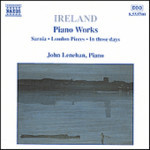
Piano Works, Vol. 1 (Incls London Pieces)
 $25.00
Out of Stock
$25.00
Out of Stock6+ weeks add to cart
JOHN IRELAND
Piano Works, Vol. 1 (Incls London Pieces)
John Lenehan (piano)
[ Naxos / CD ]
Release Date: Thursday 12 July 2007
This item is currently out of stock. It may take 6 or more weeks to obtain from when you place your order as this is a specialist product.
"John Lenehan is a very accomplished performer: not only is his technical address impeccable, but he also possesses a strikingly wide dynamic range and sophisticated variety of tone colour......Lenehan's supremely affectionate and wonderfully articulate advocacy will surely win John Ireland many new friends"
- Gramophone
"John Lenehan plays this music as though he loves it deeply, and the recording is excellent"
- Classic CD
The English composer John Ireland often complained of what he perceived as a lack of attention to his work. Nevertheless, during his lifetime, he had his fair share of exposure, although this has certainly been followed by subsequent neglect. He was born in 1879, the son of Alexander Ireland, a native of Edinburgh and business manager and publisher of the Manchester Examiner. His mother, also from Scotland, was his father's second wife and thirty years her husband's junior. Ireland had some of his early education at Leeds Grammar School, but at the age of thirteen, without his parents' knowledge, presented himself for audition at the Royal College of Music, where one of his sisters was already studying. He was accepted by the College, intending to become a concert pianist and also taking organ lessons with Sir Walter Parratt, organist of St George's Chapel, Windsor. Two years later he persuaded Stanford to accept him as a composition pupil. In the following years, while he attempted to establish himself as a composer, Ireland, supported by the money he had by then inherited from his parents, earned an additional living for himself as an organist and choirmaster, establishing lasting friendships with some of the boys in his charge. He settled in Chelsea, dividing his time between London, a retreat in Deal and regular visits to the Channel Islands. After the war he joined the teaching staff of the Royal College. There he continued to exercise influence on generations of students. In 1927 he made a brief attempt at marriage. His wife, a student some thirty years his junior, proved as unsuitable a partner as Tchaikovsky's had fifty years earlier, and the marriage was quickly annulled.
In common with other musicians, Ireland suffered disruption to his life in 1939. He had at first thought to find peace in the Channel Islands, to be evacuated to safety when the surrender of France became imminent. He spent much of the war lodging with a clergyman he had first known as a young choirmaster and once the war was over returned to Chelsea, until London became impossible for him. He spent his final years in Sussex, where he died in 1962.
Tracks:
In those days:
I. Daydream
II. Meridian
Sarnia:
I. Le Catioroc
II. In a May Morning
III. Song of the Spring Tides
Prelude in E flat major
London Pieces:
I. Chelsea Reach
II. Ragamuffin
III. Soho Forenoons
IV. Month's Mind
Ballade
Columbine


